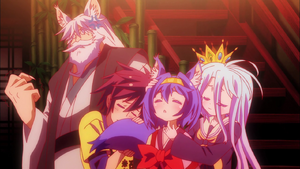 | ||
| Adapted from | Volume 2: Chapter 4, Part 1 - Epilogue | |
| Episode Navigation | ||
| Previous Episode 7 |
No Game No Life Wiki:Navigation|Index | Next Episode 9 |
| Fake End/Screenshots|Image Gallery | ||
|---|---|---|
Template:Nihongo is the eighth episode of the No Game, No Life anime series. It first aired in Japan on May 28, 2014 on AT-X, and later on May 30, 2014 on other networks.
Plot summary
Sora, Shiro, Jibril and Steph arrive at the Embassy of Elchea to challenge the Werebeasts to a game. There, they meet and Ino and Izuna. Sora and Shiro later reveal that the Werebeasts cannot read minds, but can only tell if someone is lying or not. They also reveal that the reasons the Werebeasts could win at every single game were because they challenged the other races to a video game, and because the other races could not remember what game they played or why they lost, thus having no chance of winning. Sora and Shiro then bet the Race Piece of Imanity meaning the fate of all Imanity is put at stake in this game.
Characters
The following characters are listed by the order which they appear in.
Major characters
Minor characters
- Non-speaking roles
- Unnamed werebeasts
Events
- Sora, Shiro, Jibril and Steph arrive at the Embassy of Elchea and are greeted by Hatsuse Ino
- The siblings prove that the Werebeasts sixth sense is a scam
- The siblings bet Imanity's race piece to challenge the Werebeasts for 'everything on the Eastern Union'
- Riots by the citizens of Elchea
- Sora's existence is erased
Key differences from light novel
In the light novel,
- Jibril's interest was not piqued by the television, although she did ask Sora what it was. And as opposed to anime, this is not taken into factor of consideration when they deduce Werebeasts' game.
- Steph rebutted to Ino that they had sent letters following the proper procedure to arrange a meeting with the Werebeasts. This shocked and embarrassed Ino, as he was unaware that the letters were intercepted by others. Ino later found and punished the culprit who hid the letters. This segment was skipped over in the anime.
- Shiro adds 100 points to Izuna for being moe, but in the anime, she adds 1050 points instead.
- It was never explained what would happen if a race were to lose its race piece, only vaguely stating that it would be the 'end of Imanity'. In the anime, it is explained by Feel Nilvalen that this is the first time a race had bet its race piece, and that the Ten Oaths would no longer apply to that race if the race piece were to be lost, making them no different from animals. Also, a glowing blue symbol of the race piece appears on every Imanity's left breast (where the heart is) when the race piece is bet. The symbol continues to glow faintly, and stops glowing the next day, leaving a brown birthmark of the same symbol.
- The game that the siblings were playing on their PSP was never mentioned. In the anime, they were playing Othello, which is a foreshadowing of the game in the next episode.
Trivia
- This is the first episode in which the episode title does not follow the titles of the main chapter in the light novels. Instead, it is named after the epilogue of Volume 2. It would have been titled Template:Nihongo if it followed the title of the fourth chapter of Volume 2.
- The kanji part of the episode's title means revival from death.
- The ED for this episode had edited Sora out, and warped Shiro's singing for the parts where Sora was originally at by adding static noise and sharply raising the pitch of her singing.
- There is a Yu-Gi-Oh reference when Sora is answering question three. Sora holds up the three cards, which represents the three races: The cards are a ritual card (imanity), a normal card (Flugel), and a magic card (elf). Shiro responds by activating a trap card (video game).
- There is a Hyouka reference when Jibril wants to know how Sora contacted Ino Hatsune from the library.
- The embassy closely resembles Queen Himiko's palace from Ōkami, and the music that plays resembles the music that plays in Himiko's palace.
